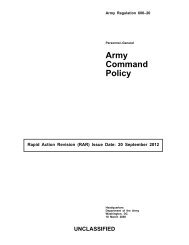Patient Administration - Army Publishing Directorate - U.S. Army
Patient Administration - Army Publishing Directorate - U.S. Army
Patient Administration - Army Publishing Directorate - U.S. Army
Create successful ePaper yourself
Turn your PDF publications into a flip-book with our unique Google optimized e-Paper software.
e. All Service members who present to the MTF for medical evaluation or treatment from off-installation locations<br />
and who will be present more than 24 hours will be required to report to the WTU for accountability and control. For<br />
those Soldiers who are on medical TDY orders, the orders will specify that the Soldier is under the command and<br />
control of the WTU for all purposes, to include all administrative and disciplinary actions, while at the MTF. All<br />
Service members in a TDRL status will report to the WTU upon arrival at the MTF for tracking and case management<br />
only; they are not in an assigned or attached status unless they are anticipated to stay at the MTF for greater than 30<br />
days (see para 8-3d). Examples of case management responsibilities for TDRL periodic reevaluation include—<br />
(1) Assisting member with obtaining all required appointments to accomplish the TDRL periodic examination.<br />
(2) Assisting member with obtaining travel advances, completion and filing of travel voucher, and resolving<br />
problems related to travel pay.<br />
8–2. Eligibility criteria<br />
A Soldier will be eligible for warrior-in-transition status and may be assigned or attached to a WTU when, based on<br />
nomination from the Soldier’s commander and the treating provider, the MTF commander determines that the Soldier<br />
meets the criteria in paragraphs a through d below. (Note: Also see ineligibility criteria in para 8-3, below.)<br />
a. An Active <strong>Army</strong> Soldier—<br />
(1) Who requires a temporary profile of more than 6 months’ duration, and—<br />
(a) Whose duty limitations preclude the Soldier from contributing to, or otherwise interfere with accomplishment of<br />
the parent unit’s mission, or<br />
(b) Whose treatment plan requires the Soldier to spend most of his/her time receiving (and/or traveling to and from)<br />
medical treatment, or otherwise absent from parent unit.<br />
(2) Who requires an MEB. Soldiers in the MEB process will be assigned to the WTU unless an exception to policy<br />
is requested by the Unit Commander and granted by the MTF commander. Thus, the nominative process does not<br />
apply to Soldiers in the MEB process who, in the majority of circumstances, will be either assigned or attached to the<br />
WTU. Soldiers in the MEB process who live on an installation with a WTU must be assigned to the WTU unless the<br />
Soldier’s commander grants an exception to policy. Exceptions to assignment may be considered for Soldiers residing<br />
off the installation for whom attachment may not be prudent when considering the impact on Family members. Soldiers<br />
undergoing adverse administrative action (per para 8-3f) or UCMJ action may not transfer to the WTU until the action<br />
is resolved.<br />
(3) Whose profile limitations preclude deployment (AR 40-501, chap 5) within the next 60 days and whose unit is<br />
scheduled to deploy within 60 days, and—<br />
(a) Whose unit has no rear detachment, or<br />
(b) Whose rear detachment capabilities are insufficient to accommodate the Soldier’s physical limitations or mental<br />
health needs, or<br />
(c) Whose limitations prevent the Soldier from contributing to, or otherwise interfere with accomplishment of the<br />
rear detachment’s mission.<br />
b. An RC Soldier who qualifies for WTU according to current personnel policy guidance (PPG) including RC<br />
Soldiers on medical retention processing, medical retention processing 2, and active duty medical extension (ADME)<br />
orders.<br />
c. An Active Guard and Reserve Soldier (10 USC or 32 USC) who meets the WTU criteria of Active <strong>Army</strong> Soldiers<br />
(as in para 8-2a) is eligible for a WTU.<br />
d. An AD Soldier, regardless of component—<br />
(1) Who is an inpatient at any facility.<br />
(2) Who arrives at the MTF from a named operation, or arrives from an OCONUS location and, as determined by<br />
the MTF commander, meets the condition of continuation of attachment in paragraph 8-2a or assignment in accordance<br />
with paragraph 8-6. All inpatients/outpatients medically regulated from an area of operations to a receiving MTF will<br />
travel on temporary-change-of-station orders. Such patients will be attached and under the command and control of the<br />
receiving MTF’s WTU for all purposes to include command and control for all administrative and disciplinary actions.<br />
Soldiers will remain in attached status until dispositioned by the MTF, at which time Soldiers will be released from<br />
attachment. Soldiers will in-process into the WTU. At a minimum, personnel and finance in-processing will be<br />
accomplished as soon as the patient’s condition permits. Notification to the Soldier’s unit will be made within 24 hours<br />
of the Soldier’s arrival.<br />
(3) Who arrives at a CONUS MTF from an OCONUS location and, as determined by the MTF commander, is<br />
expected to remain away from his/her parent unit longer than 30 days.<br />
8–3. Ineligibility criteria<br />
Under usual circumstances, the personnel in paragraphs a through g, below, are not eligible for attachment or<br />
assignment to a WTU. Exceptions may be made by the MTF commander, in consultation with the Soldier’s treating<br />
provider and unit commander, for valid clinical reasons.<br />
a. Soldiers with normal uncomplicated pregnancy.<br />
62 AR 40–400 27 January 2010
















